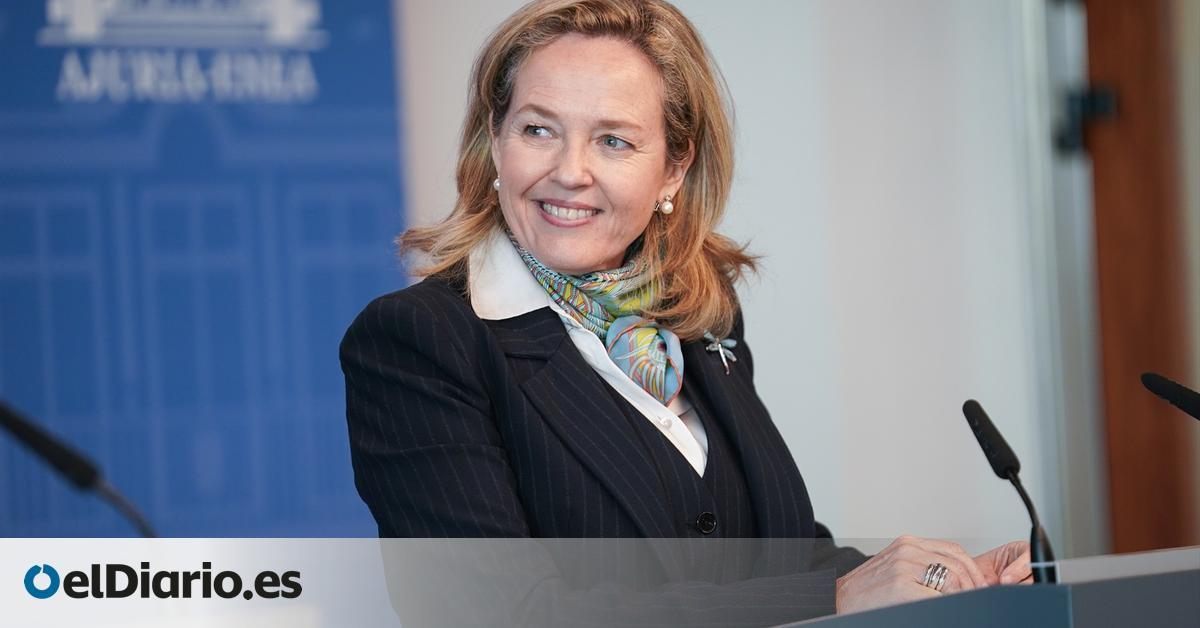
The first vice president and minister of Economic Affairs and Digital Transformation, Nadia Calviño, has contacted the executive president and maximum shareholder of Ferrovial, Rafael del Pino, to express the government’s rejection of the transfer of the Spanish multinational to the Netherlands, communicated this Tuesday to the market.
According to government sources, the vice president “had a conversation with Rafael del Pino, in which he clearly expressed his rejection of the decision that was communicated yesterday.” The same sources point out that the ministry is waiting to know the details “to analyze and closely follow the possible implications of this erroneous decision.”
Economy stresses that “it is a company that owes everything to Spain. It is not acceptable that a company that was born and grew in Spain and thanks to the public investment of Spanish citizens shows this lack of commitment to its country”.
Sources from the ministry point out that “it is paradoxical that this possible decision is announced at a time of significant attraction of foreign investment and confidence of investors and foreign companies in our country, and with an unprecedented process of public investment and modernization underway in recent years.” sectors in which the Ferrovial group is present”.
Subsequently, Calviño has declared in an interview in La Sexta about Ferrovial’s decision: “I do not share a decision that seems to go against the interest and image of our country; the gesture towards Spain is more than any other consideration. It is a company that owes everything to Spain, which has grown thanks to public investments financed by all Spanish citizens”.
The Second Vice President of the Government and Minister of Labor and Social Economy, Yolanda Díaz, has also shown her rejection of the operation, who has trusted that “the Ministry of Economy will adopt the necessary measures to prevent this from happening”. reports Laura Olias.
Díaz has demanded from the company “commitment to our country, to Spain”, and has asked the shareholders of the construction company “to reconsider this position”. “I am sure that many Spanish men and women today are stunned by this news.”
“In moments of commitment and need, companies have to be exemplary. And this cannot be”, Díaz added at his departure from the meeting Generation of Opportunities in Women organized by Europa Press and McKinsey & Company.
The Minister of Labor pointed out that “Ferrovial is a very important company in our country that has also grown at the risk of huge contracts with the public administration.” And she has pointed out that “we have to work in a Europe in which tax dumping does not exist. That is to say, that we are observing today how without shame a Spanish company tells us that it is moving its registered office to the Netherlands because tax conditions are better there”. “We are talking about fiscal dumping, I am clear.”
An analysis carried out by Banco Sabadell on this operation estimates that the savings for Ferrovial will be around 40 million euros per year. This saving will come mainly from the different taxation of the profits that companies repatriate from other countries. Spain subsidizes only 95% of these dividends, while in the Netherlands it is 100%. The higher level of agreements that the northern European country has with other countries makes it more fiscally attractive for a multinational to establish its headquarters there. It is an element that organizations such as Oxfam Intermón, which consider the Netherlands a tax haven in the EU, have historically criticized.
The construction group announced on Tuesday to the National Securities Market Commission (CNMV), taking advantage of its presentation of annual results, that its board of directors, headed by del Pino, has proposed a merger between its parent company and the current Ferrovial International, a Dutch European public limited company that already owns 86% of the company’s assets, which will mean the transfer of the registered office from Spain to the Netherlands.
After this step, it will request double admission to trading in that country, with which it will be listed in Spain and, later, it is expected that it will also be listed in the United States.
In its presentation to the CNMV, Ferrovial has not provided details of the tax impact of this operation. The Dutch rate in that country is slightly higher than in Spain (25.8% vs. 25%). The company has explained to elDiario.es that all its subsidiaries in Spain will continue to pay their taxes locally and that the final impact of these, due to the repatriation of dividends by the parent company, is very limited.
Shareholders who are against the operation may sell their shares to the company but with limitations. The company has explained that they will be able to exercise the “Separation right”, which involves Ferrovial buying their titles, but with a total maximum amount of 500 million euros. If the cost of compensating shareholders who reject the operation is higher than that figure, the move will not go ahead. In addition, for this merger to take place, the company must have “reasonable certainty of double admission to trading in the Netherlands and in Spain”.
Spanish roots
In its presentation, Ferrovial has indicated that “an impact on the business is not expected” in relation to “the strategy, investment plans, organization or daily operations” and that “it expects Spain to remain the main source of talent development.
The argument is that “listing in the Netherlands enhances the internationalization of Ferrovial, while maintaining its Spanish roots” and that this is the country that companies tend to choose when they want to boost their business in the US market. “The transaction is expected to facilitate future listing in the United States,” he says.
Rafael del Pino has channeled his participation in Ferrovial for years through a Dutch company. At the end of 2022, the executive indirectly controlled 20.25% of the construction company through his Dutch company Rijn Capital BV, in which he has 99.87%.
At the beginning of 2019, the construction company, owner of the British Heathrow airport, already moved its international business from Oxford (United Kingdom) to Amsterdam (Holland), transferred from Madrid to the United Kingdom in 2015, to protect itself from Brexit and keep companies under control. European legislation. Almost a decade ago, according to information published by Voz Populi, Rafael del Pino paid 200 million to the Treasury to avoid the tax crime for expatriating dividends to the Netherlands.
Right of separation
Regarding the next steps, Ferrovial has explained that it will be the company’s shareholders’ meeting that will have to approve the merger of the companies and that it expects it to be ready in the third quarter of this year. The Del Pino family controls more than 32% of Ferrovial, according to CNMV records.
Ferrovial has announced this corporate operation in parallel to its 2022 results, the year in which it had a net profit of 186 million euros, 84% less -due to extraordinary minors-, although it achieved a 4.2% increase in sales. sales, which stood at 7,551 million.
Regarding the remuneration of Rafael del Pino as president of the company, he received 5.2 million euros in 2022, which represents an increase of 16% compared to the 4.5 million he earned in 2021.
Source: www.eldiario.es

